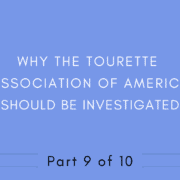Criteria for a Diagnosis of Tourette Syndrome and Tic Disorders
The American Psychiatric Association’s Diagnostic and Statistical Manual of Mental Disorders, Fifth Edition (DSM-5) is used by health professionals to help diagnose tic disorders. Tics are sudden twitches, movements, or sounds that people do repeatedly. People who have tics cannot stop their body from doing these things. For example, a person with a motor tic might keep blinking over and over again. Or, a person with a vocal tic might make a grunting sound unwillingly.
Three types of tic disorders are included in the DSM-5:
- Tourette’s disorder (also called Tourette Syndrome)
- Persistent (also called chronic) motor or vocal tic disorder
- Provisional tic disorder
The tic disorders differ from each other in terms of the type of tic present (motor or vocal, or a combination of both), and how long the symptoms have lasted. People with TS have both motor and vocal tics, and have had tic symptoms for at least 1 year. People with persistent motor or vocal tic disorders have either motor or vocal tics, and have had tic symptoms for at least 1 year.
People with provisional tic disorders can have motor or vocal tics, or both, but have had their symptoms less than 1 year.
The criteria for diagnosis have been updated with the recent publication of the 5 edition of the DSM. One change was to use the term ‘provisional’ tic disorder rather than ‘transient’ tic disorder for tics that started less than a year before diagnosis. In DSMIV, a diagnosis of TS or persistent tic disorder required that there was no tic-free period of 3 months or more in the year prior to diagnosis. This is no longer required.
Here are the criteria in shortened form. Please note that they are presented for your information only and should not be used for self-diagnosis. If you are concerned about any of the symptoms listed, you should consult a trained health care provider with experience in diagnosing and treating tic disorders.
The criteria are presented here in modified form to make them more accessible to the general public. They are listed here for information purposes only and should not be used for self diagnosis. If you are concerned about any of the symptoms listed, you should consult a trained health care provider with experience in diagnosing and treating tic disorders.
Tourette Syndrome (TS)
For a person to be diagnosed with TS, he or she must:
- have both multiple motor tics (for example, blinking or shrugging the shoulders) and vocal tics (for example, humming, clearing the throat, or yelling out a word or phrase), although they might not always happen at the same time.
- have had tics for at least a year. The tics can occur many times a day (usually in bouts) nearly every day, or off and on.
- have tics that begin before he or she is 18 years of age.
- have symptoms that are not due to taking medicine or other drugs or due to having another medical condition (for example, seizures, Huntington disease, or postviral encephalitis).
Persistent (Chronic) Motor or Vocal Tic Disorder
For a person to be diagnosed with a persistent tic disorder, he or she must:
- have one or more motor tics (for example, blinking or shrugging the shoulders) or vocal tics (for example, humming, clearing the throat, or yelling out a word or phrase), but not both.
- have tics that occur many times a day nearly every day or on and off throughout a period of more than a year.
- have tics that start before he or she is 18 years of age.
- have symptoms that are not due to taking medicine or other drugs, or due to having a medical condition that can cause tics (for example, seizures, Huntington disease, or postviral encephalitis).
- not have been diagnosed with TS.
Provisional Tic Disorder
For a person to be diagnosed with this disorder, he or she must:
- have one or more motor tics (for example, blinking or shrugging the shoulders) or vocal tics (for example, humming, clearing the throat, or yelling out a word or phrase).
- have been present for no longer than 12 months in a row.
- have tics that start before he or she is 18 years of age.
- have symptoms that are not due to taking medicine or other drugs, or due to having a medical condition that can cause tics (for example, Huntington disease or postviral encephalitis).
- not have been diagnosed with TS or persistent motor or vocal tic disorder.
Source: Center for Disease Control










I find the diagnostic criteria very confusing. My child has had a few different tics over the past year. Never occurring together and never occurring for more than a week or two. My dr didn’t seem very concerned, but naturally, I am. I am looking for triggers because I feel there are some. What I don’t understand is can a child/person have transient(or provisional) tic disorder for more than one year or do they automatically receive a diagnosis of Tourette’s? I originally thought that people could be diagnosed with transient tic disorder and have this for life. The way the diagnostic criteria reads is that if it is present at all for more than one year it is not transient. Now, does this mean present for 12 months in a row or present at all(with fluctuation) for 12 months. Very confusing.
Hi Dorothy, you are so right that the different tic diagnoses are confusing. Try to remember that these are to a great degree arbitrary labels. Arbitrary in the sense that the medical community has drawn lines in the sand and assigned different labels–but this doesn’t necessarily help your child.
A parent recently called me and said, “My son has had vocal tics and body tics for 11 months. The doctor said we should watch and if it goes on for another month it means he has Tourette syndrome. Then we can talk about medications for Tourettes.” Even the doctor feels his or her hands are tied unless they consult a calendar.
How has this helped the family? What if the manual said 14 or 16 months before a diagnosis? What is being done to help the child in the meantime while everyone just watches the days go by? Of course it’s not that that strong medication is desirable as a goal. But families shouldn’t have their hands tied over a label. They should begin trying to figure out why their child has tics as soon as they begin.
Just remember that having tics is not normal. Period. Something is causing it and people should be encouraged to find out what that could be.
Sometimes adults know they can get an eye tic when they’re overly fatigued, and they know from experience that it will go away once they are rested. But not all transient tics — or provisional tics, to use the new terminology as you point out — are not so simple. They represent a state of imbalance and should be addressed. Not with strong drugs, but with efforts to calm the nervous system through more natural means with a goal to correcting the underlying imbalance.
The current Tourette syndrome diagnosis includes having vocal tics as well as the “motor” or body tics for more than one year. And a chronic tic “many times a day nearly every day or on and off throughout a period of more than a year.” Does your child fall in that category of many times a day nearly every day? If not, I think you are safe in calling it a transient tic.
Interestingly, the publication A Physician’s Guide to the Diagnosis of Tourette Syndrome by the Tourette Syndrome Association says: The difference between Tourette syndrome and other tic syndromes may be no more than semantic. (!)
So, I’d suggest you don’t worry about the label and carry on with your instincts of looking for triggers. Depending on the situation, you may need professional help to find them, and then further, to hopefully learn what can be done to calm your child’s hyper-reactive state.
You are so right, it is confusing (and confining) if you stick to the labels. If you simply look at tics as a symptom of something being out of balance in the body, it is not confusing and you can begin to help your child.
Thank you for your comment, Dorothy.